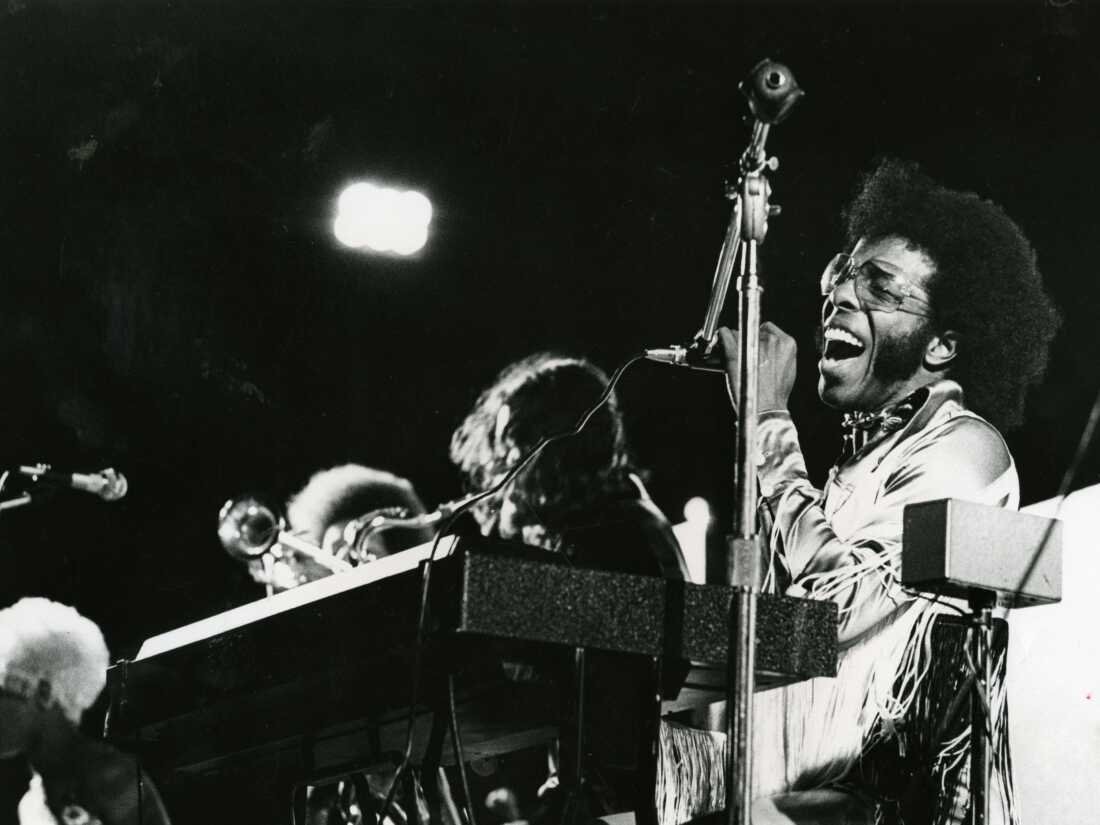
The Household Stone performs at Harvard Stadium in 1969.
Ellis Herwig/Boston Globe/Getty Pictures
cover caption
toggle caption
Ellis Herwig/Boston Globe/Getty Pictures
Sly Stone, the outstanding, eccentric frontman, singer, songwriter and producer of his household group, Sly & the Household Stone, died in Los Angeles on Monday, June 9. The musical icon had been battling lung illness, in accordance with an announcement supplied by his household. He was 82.
“Whereas we mourn his absence, we take solace in understanding that his extraordinary musical legacy will proceed to resonate and encourage for generations to return,” the assertion reads.
Born Sylvester Stewart, the second of 5 kids, he and his household moved from Denton, Texas to Vallejo, Calif. when he was an adolescent. The household was closely concerned within the Church of God In Christ.
By age 8, Stone was recording gospel music along with his siblings, Freddie, Rose and Vaetta as The Stewart 4. You possibly can hear Stone as a baby belting out “On the Battlefield of the Lord” on a single they recorded in 1952.
He was nonetheless in grade faculty when a good friend misspelled “Sylvester” as “Sly.” The nickname caught. By age 11, Stone turned proficient in keyboards, guitar, bass, and drums. In highschool, he’d shaped a multi-racial doo-wop group, The Viscaynes, which recorded some singles in Los Angeles.
As a younger man, Stone was a profitable disc jockey for KSOL, an R&B radio station in San Mateo, Calif. His playlists included well-liked data by white artists corresponding to The Beatles and The Rolling Stones.
Throughout this time Stone additionally labored as a report producer for Autumn Data, producing San Francisco-area bands. One of many Stone-produced singles was Bobby Freeman’s “C’mon and Swim,” which reached No. 5 on the U.S. pop chart in 1964.
Stone and his brother Freddie merged their very own bands collectively in 1966 to kind Sly & the Household Stone. In it, girls — notably — weren’t simply vocalists but in addition performed devices, a rarity for the period. And it included each Black and white musicians. Inside a couple of years, the group was turning out hits corresponding to “On a regular basis Individuals,” “Household Affair” and “Dance to the Music.”
Though the group attracted a big and various viewers from its beginnings, Stone was pressured by the Black Panthers to kick the white members out of the group — generally menacingly and in particular person, as saxophone participant Jerry Martini recalled in a 2013 interview with NPR.
“Sly all the time, all the time stood up for me, and in lots of cases, he saved my butt,” Martini mentioned.
Sly & the Household Stone’s sound was a stunning fusion of psychedelic rock, soul, jazz, gospel and Latin. The group’s early morning efficiency at Woodstock in 1969 was well known as a legendary second in a legendary live performance.
“The decision, the response. It felt like church,” Stone wrote in his 2023 memoir Thank You (Falettinme Be Mice Elf Agin). “The horns went up into the sky. When the present was over, we have been moist and chilly. I do not bear in mind how I left, possibly the identical method I got here in, however I wasn’t there to see Jimi [Hendrix] shut the competition.”
“We knew one thing magical was occurring. I feel after we realized that it was a sea of individuals in entrance of us,” Sly’s sister, Rose Stone, informed NPR in 2007. “It was about 5:00 AM once we went on. It was darkish, and we have been taking part in our greatest … and the solar began to return up and abruptly all we might see was only a sea of individuals. I feel it was like an apex of our group.”
Within the Nineteen Seventies, Sly Stone’s music obtained gloomier and extra cynical, reflecting a world made bleak by the assassinations of Dr. Martin Luther King Jr. and President John F. Kennedy, in addition to elevated racial tensions and the horrors of the Vietnam Battle.
After taking part in a few of the most euphoric and politically charged music that outlined a technology, Sly and the Household Stone dissolved, partially, due to Stone’s well-documented drug abuse. He turned notorious for ghosting his personal reveals.
By the Nineteen Eighties, Sly Stone had slipped into seclusion. He was arrested for cocaine possession in 2011. However within the mid 2000s, he began to make sporadic public appearances, together with performing along with his daughter’s band, Child Stone. The Grammys gave him a lifetime achievement award in 2017. His memoir, wrote Related Press reviewer Christopher Weber, “overflows with wit and wordplay.” Sly Stone was a musical visionary whose charismatic stage presence and distinctive vocals at the moment are woven into the material of American pleasure.



